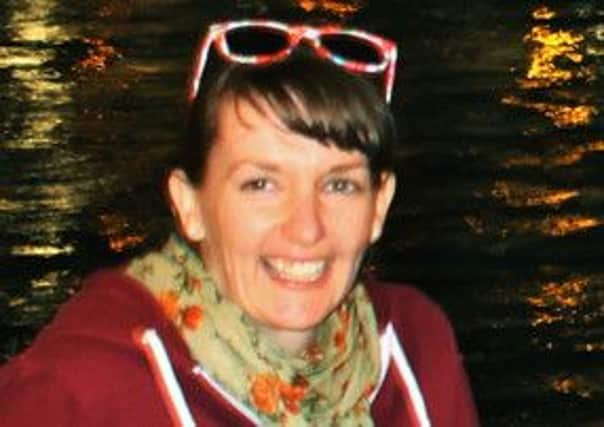Scots Ebola nurse ‘critical’ and fighting for life


Medics at the Royal Free hospital in London, where the Scot has been treated for the last five days, say her condition has deteriorated in the last 48 hours.
Cafferkey, a public health nurse, contracted Ebola after returning from Sierra Leone where she had been volunteering.
Advertisement
Hide AdAdvertisement
Hide AdThe 39-year-old who lives in Cambuslang, South Lanarkshire, was diagnosed with the virus last Monday, hours after arriving home to Glasgow.
In a statement, the London hospital said: “We are sorry to announce the condition of Pauline Cafferkey has gradually deteriorated over the past two days and is now critical.”
Expert microbiologist Professor Hugh Pennington last night said he believed luck will play a role in the nurse’s survival chances because experts still do not know enough about the deadly virus.
The Aberdeen-based expert said people with the disease can deteriorate “very quickly” and he believes using blood from a recovered Ebola patient to treat Cafferkey was her “best chance” for a recovery. “We have to keep our fingers crossed and hope for the best. It’s the luck of the draw unfortunately. Some people do recover, but some don’t make it. We still don’t know enough about Ebola.”
He added: “The plasma is probably her best chance of treatment as that is actual antibodies from people who have recovered from Ebola.
CONNECT WITH THE SCOTSMAN
• Subscribe to our daily newsletter (requires registration) and get the latest news, sport and business headlines delivered to your inbox every morning
“Because of the small number of people treated with experimental drugs, it’s difficult to judge the percentage of success. We also don’t know the circumstances of the infection. That might be important.”
Cafferkey’s sudden change in condition comes after the main doctor treating her in London, Dr Michael Jacobs, described her as sitting up, eating, drinking and communicating with her family on New Year’s Day.
Advertisement
Hide AdAdvertisement
Hide AdBut Jacobs had warned she faced a “critical” few days while she was treated with the blood from a survivor and an experimental anti-viral drug which is “not proven to work”.
The Royal Free was unable to obtain ZMapp, the drug used to treat recovered British volunteer and nurse William Pooley, because “there is none in the world at the moment”.
Yesterday, leading political figures wished the Scottish nurse well.
First Minister Nicola Sturgeon said: “Our thoughts continue to be with Pauline Cafferkey and her family during this extremely distressing time.“I would like to thank all of the health professionals involved in treating Pauline, as they continue to show tremendous dedication and expertise.”
Prime Minister David Cameron tweeted: “My thoughts and prayers are with nurse Pauline Cafferkey who is in a critical condition with Ebola.”
Health Secretary Jeremy Hunt said that the nurse is being given the “best possible care”. In a statement he said: “I know Dr Mike Jacobs and his team at the Royal Free Hospital are working tirelessly to provide her with the best possible care.”
Cafferkey, who works at Blantyre Health Centre in South Lanarkshire, was part of a team of medical volunteers deployed to Africa by the UK Government last month and had been working with Save the Children at the Ebola Treatment Centre in Kerry Town, Sierra Leone.
She was the second Briton to test positive for Ebola – and the first to do so on UK soil. Nurse William Pooley, 29, contracted Ebola while volunteering in Sierra Leone in August before getting the all-clear following treatment at the Royal Free Hospital.
Advertisement
Hide AdAdvertisement
Hide AdCafferkey was admitted to hospital in Glasgow on Monday morning after arriving the previous night at Heathrow airport, part of a group of 30 health volunteers.
She was considered a high risk because of the nature of her work but showed no symptoms during screening and a temperature check.
Then while waiting for the flight to Glasgow she raised fears about her temperature and was tested a further six times in the space of 30 minutes.
The Government’s chief medical officer, Dame Sally Davies, admitted questions have been raised about the airport screening procedure for Ebola.
Speaking about her treatment, Dr Jacobs said on New Year’s Day: “At the moment, we don’t know what the best treatment strategies are.
“That’s why we’re calling them experimental treatments. As we’ve explained to Pauline, we can’t be as confident as we would like. There’s obviously very good reason to believe it’s going to help her, otherwise we wouldn’t be using it at all, but we simply don’t have enough information to know that’s the case.”
Public Health England confirmed yesterday all UK-based passengers and crew aboard the two flights taken by the nurse from Morocco and London have now been contacted by medical authorities and given advice.
SEE ALSO:
SCOTSMAN TABLET AND IPHONE APPS